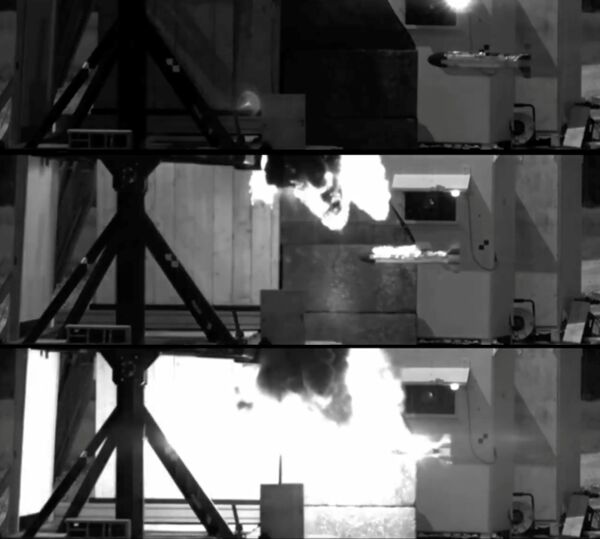
This series of images shows the Diamant hard-kill APS intercepting and defeating a test projectile representing an ATGM. (Thales)
The French Direction générale de l'armement (DGA) procurement agency confirmed at SAE Media Group's Future Armoured Vehicles Survivability (FAVS) 2023 conference – held in London from 13 to 15 November – that it had begun to test the Thales Diamant hard-kill active protection system (APS).
Since 2022 tests have been carried out using a Diamant mounted on a Griffon multirole armoured vehicle (Véhicule Blindé Multi-Rôle: VBMR), including both static tests and on-the-move trials at a speed of 70 km/h. A reusable modular test rig has also been constructed that can be used to model the performance of the Diamant APS on various vehicles, and which is able to respond to simultaneous threats fired from the front and rear of the rig.
Diamant is a distributed hard-kill APS comprising four frequency-modulated continuous wave (FMCW) radar sensors mounted on the corners of the vehicle, a number of effector modules mounted around the perimeter of the vehicle on its roof and around its bonnet, and a power supply system for its control unit computer. Earlier iterations of Diamant relied on optical sensors to detect threats, which were less reliable in challenging environmental conditions such as dense smoke.
The system works by using the radars to detect and track possible threats such as anti-tank rockets (ATRs) and anti-tank guided missiles (ATGMs). Once a threat is detected, the system tasks the appropriate effector module with launching a countermeasure into the path of the threat in order to destroy or degrade it sufficiently so that it can no longer perforate the vehicle's passive armour.
Looking to read the full article?
Gain unlimited access to Janes news and more...







